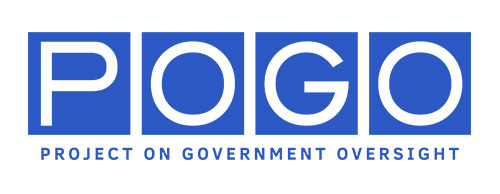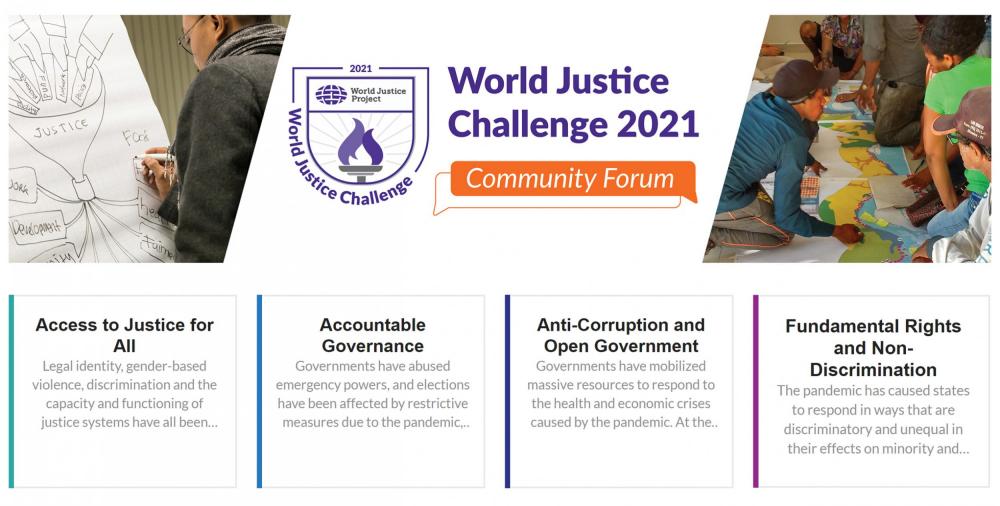Project Pitch and Q&A
Watch Project On Government Oversight's World Justice Challenge project pitch and join WJP's World Justice Challenge 2021 Community Forum to ask questions to project representatives, explore additional resources, meet new colleagues, and more. Join the discussion and help us build stronger rule of law values, institutions and communities around the world.
Ask your question at the Community Forum
Project Summary
POGO launched a COVID-19 relief spending tracker that includes over 15 million transactions, accounting for $1.6 trillion in assistance, the largest picture of United States federal spending on the COVID-19 crisis available. The website includes an industry-by-industry spending breakdown, and a mapping feature with data on demographics and unemployment down to the zip code level. This living resource provides accountability and transparency on the government's response to the pandemic. POGO is also using this tracker to conduct investigations that reveal waste, fraud and abuse, and our policy team is actively working with lawmakers to improve oversight of COVID relief spending.
Problem Statement
The task of the federal government is to adopt long term policies that protect its citizens. In response to the COVID-19 pandemic crisis and resulting recession, the government passed a $2 trillion dollar relief bill, the Coronavirus Aid, Relief, and Economic Security (CARES) Act, that was meant to provide economic relief to the American public. Instead, it brought what may be a crushing end to the financial security of small businesses and their communities. The Project On Government Oversight (POGO) seeks to shine a light on the failures of the government response and build support for reforms that will prevent such failure in the future.
Preliminary data from the Paycheck Protection Program (PPP), one of the largest programs in the CARES Act meant to keep small businesses afloat and keep people employed, indicates that more than half of the $522 billion aimed at small and midsized companies went to bigger businesses. More than a quarter of the money went to a mere 1% of loan recipients. Employees who relied on their paychecks from small businesses to feed their families have been forced to rely on overwhelmed state unemployment agencies and food banks to survive; this created a "K-shaped recovery" where people already on the edge of poverty before this crisis have little to no support from the federal government while the wealthy thrive.
In 2020, government oversight and accountability mechanisms failed to prevent government secrecy about COVID-19 assistance recipients, massive fraud, and legalized corruption in the midst of the greatest crisis of a generation. Most importantly, they largely failed to ensure that federal aid flowed to the communities who needed it most desperately.
Project Description
POGO is working to ensure that communities most adversely affected by the pandemic are provided economic opportunity to survive and rebuild. The best way to achieve this is by providing data and storytelling on the failure of federal spending on the crisis so far, and use that as evidence of the need for future oversight reforms that will fix future spending and ensure it flows where it is needed most.
Access to information on the CARES Act, the largest stimulus package in U.S. history, is necessary to evaluate the program and identify failures. POGO launched an independent COVID-19 federal relief spending tracker that consolidates assistance data from multiple government sources, and includes mapping and visualizations, making it far more accessible and understandable to the public, journalists, and civil society organizations than the data published by the government.
POGO's tracker also provides a much-needed critical look at the socioeconomic conditions of recipients. While the government is obliged to report some data on COVID relief spending, putting these figures into context is outside the requirements that the CARES Act imposes on agencies. By including two initial data overlays indicating unemployment rates and minority population percentage by location compared to federal assistance spending, users can better understand where the money is flowing, and see flaws in the program where unemployment is high, and minority populations have not been served. We are exploring additional data overlays including eviction data, COVID-19 cases, and median income.
POGO's award-winning investigations team is also working to highlight patterns of corruption and undue influence in the government's response to the pandemic. Local newspapers no longer have the investigative and research capacity they once did, and our tracker and investigations help fill that gap and provide unique tools and data capacity to improve the narrative around this crisis. We can also ensure that local advocacy groups can use our data to advocate for better representation. The power of storytelling can motivate the public to push back against unfair and inequitable government policies.
Finally, POGO's policy team will use the data and information from our investigations to push Congress and government agencies for stronger oversight of federal spending, especially in response to crises that heighten the risk of fraud, corruption, and abuse. Our team is building recommendations the government should adopt in future spending decisions to ensure aid reaches the communities who need it most and prevent waste and fraud.
Project Impact and Potential for Scaling, Replication, and Sustainability
POGO's biggest impact on the crisis so far was successfully working with lawmakers to include oversight and accountability measures in the CARES Act. POGO worked directly with Congress to include provisions that created the Pandemic Response Accountability Committee, a body that is empowered to collect and share data, and coordinate audits to evaluate the spending and ferret out wrongdoing. The Act also created a new position of special inspector general for pandemic recovery within the Treasury Department who can investigate waste, fraud, and abuse within the spending programs. We heard from insiders on both sides of the aisle that those safeguards would not have been included without POGO's expertise and work.
While these oversight measures were not sufficient, they were certainly better than having none inserted into the legislation at all, and having some information available has shed light on the failures of the program. POGO will scale the project by updating our tracker with additional spending data as it becomes available and incorporating that data into our mapping technology tool. Our priority is to update the tracker with spending data from additional stimulus funds that are making their way through Congress now. We will also explore linking additional data overlays including COVID-19 cases, eviction rates, and median income data to provide further context for the federal response unavailable on any other platform.
Given the enormous amounts of money associated with the CARES Act and the millions of transactions it spurred in the form of loans, grants, and contracts, there is an ongoing need for that data to be analyzed and reported on, even as we claw our way out of this crisis.
Our tracker holds potential to be replicated in any number of ways, including for any future crisis spending of any size. Emergency spending on natural disasters caused by increasingly extreme weather patterns, an earthquake devastated area, or a stimulus bill to address a future recession could be integrated into this site, or a new tracker like it. The government can also learn from the oversight mechanisms in the CARES Act, and ensure future government spending of all kinds has robust independent oversight, data collection, and reporting mechanisms. By building a template for stronger oversight, we believe POGO's policy work, bolstered by the data tracker and our investigations, will be the most effective way to improve government services and ensure equitable rescue spending in times of crisis.
Featured Resources
- The Atlanta Journal-Constitution: Forced Release of Federal Data Shows More Bailout Loans Went to Questionable Players (Dec 2020 - PDF)
- The Washington Post: More Than Half of Emergency Small-business Funds Went to Larger Businesses, New Data Shows (Dec 2020 - PDF)
Key Project Links
Social Media: Facebook, Twitter, YouTube, Instagram, LinkedIn
Website: pogo.org
Submit Your Questions and Get Ready to Pick a Winner!
Representatives of World Justice Challenge 2021 finalist projects are on hand to answer your questions. Join our online Community Forum to engage with finalists, share resources, and network with other members of the rule of law community. Submit your questions now and get ready to vote for your favorite project—voting opens in mid-April!
Join the Conversation

